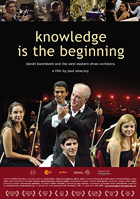Daniel Barenboim gives a New Year’s comment on the guardian online edition and makes clear that:
The first question is if Israel’s government has the right to make all Palestinians culpable for the actions of Hamas. Is the entire population of Gaza to be held responsible for the sins of a terrorist organisation? We, the Jewish people, should know and feel even more acutely than other populations that the murder of innocent civilians is inhumane and unacceptable. The Israeli military has very weakly argued that the Gaza Strip is so overpopulated it is impossible to avoid civilian deaths during operations.
The feebleness of this argument leads to my next questions: if civilian deaths are unavoidable, what is the purpose of the bombardment? What, if any, is the logic behind the violence, and what does Israel hope to achieve through it? If the aim is to destroy Hamas then the most important question to ask is whether this is attainable. If not, then the whole attack is not only cruel, barbaric and reprehensible, it is senseless. ….
Barenboim, together with Edward said is also the initiator of the outstanding West-Eastern Orchestra project (see description in the intro to the related film).
| In the early 1990s, a chance meeting between Mr. Barenboim and the late Palestinian-born writer and Columbia University professor Edward Said in a London hotel lobby led to an intensive friendship that has had both political and musical repercussions. These two men, who should have been poles apart politically, discovered in that first meeting, which lasted for hours, that they had similar visions of Israeli/Palestinian possible future cooperation. |  |
| They decided to continue their dialogue and to collaborate on musical events to further their shared vision of peaceful co-existence in the Middle East. This led to Mr. Barenboim’s first concert on the West Bank, a piano recital at the Palestinian Birzeit University in February 1999, and to a workshop for young musicians from the Middle East that took place in Weimar, Germany, in August 1999. | |
Our project may not change the world, but it is a step forward. It is an ongoing dialogue, where the universal, metaphysical language of music links with the continuous dialogue that we have with young people, and that young people have with each other.
We don’t see ourselves as a political project, but rather as a forum where young people from Israel and all the Arab countries can express themselves freely and openly whilst at the same time hearing the narrative of the other. It is not necessarily a question of accepting the narrative of the other, let alone agreeing with it, but rather the indispensable need to accept its legitimacy. We believe in only two absolutely necessary political ideas:
– There is no military solution to the Israeli-Palestinian conflict.
– The destinies of the Israeli and Palestinian people are inextricably linked and the land that some call Greater Israel and others Palestine is a land for two people.
Music makes the West-Eastern Divan possible because it does not contain limited associations as words do. Music teaches us that there is nothing that does not include its parallel or opposite as the case may be; therefore no element is entirely independent because it is by definition in a relationship of inter-dependence. It is my belief that although music cannot solve any problems, since it is as Busoni said “sonorous airâ€, it can teach us to think in a way that is a school for life. In music we know and accept the hierarchy of a main subject, we accept the permanent presence of an opposite, and sometimes even of subversive accompanying rhythms. (read on)
